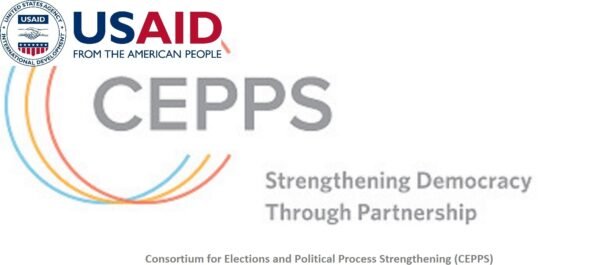USAID $486 million Scam: CEPPS biggest scam in human history?

Overview of CEPPS and Its Funding
The Consortium for Elections and Political Process Strengthening (CEPPS) is a collaboration of three prominent organizations: the National Democratic Institute (NDI), the International Republican Institute (IRI), and the International Foundation for Electoral Systems (IFES). They work together to promote democratic governance and enhance electoral processes around the world.
https://cepps.org/ The CRIPPS Website is Currently Unavailable
USAID’s Funding to CEPPS
In recent years, USAID has provided substantial financial resources to CEPPS to support democratic initiatives and electoral integrity in various countries. The mention of a $486 million grant likely refers to a significant investment aimed at strengthening political processes, improving governance, and enhancing civic engagement in countries where democracy is fragile or developing.
Allegations of Misuse and Criticism
Claims of Fraud
The assertion that the CEPPS funding constitutes a “scam” is a serious allegation. Critics often raise concerns regarding:
Accountability: Questions about how funds are allocated and whether they lead to tangible outcomes.
Effectiveness: Scrutiny of whether the initiatives funded by CEPPS genuinely support democratic processes or yield the intended positive results.
Transparency: Calls for clearer reporting and oversight of how funds are utilized.
Historical Context
Concerns over large grants and potential misuse are not new, especially in the realm of international development aid. Critics argue that without stringent oversight, such grants can sometimes be mismanaged or fail to achieve their intended objectives.
Importance of Oversight and Accountability
Ensuring Effective Use of Funds
Ensuring that funds are used effectively requires:
Robust Monitoring: Independent evaluations and audits to assess the impact of funded projects.
Stakeholder Engagement: Involving local communities and stakeholders in the planning and execution of projects.
Transparency Measures: Public disclosure of funding allocations and outcomes to maintain trust and accountability.
Moving Forward
If there are genuine concerns regarding misuse or ineffectiveness of funds through organizations like CEPPS, it is crucial to engage in constructive dialogue. Advocacy for improved oversight and accountability mechanisms can help enhance the effectiveness of international aid and support meaningful democratic processes.
While the designation of the CEPPS grant as a “scam” warrants scrutiny, it is essential to approach such claims with a balanced perspective. Focusing on accountability, transparency, and constructive criticism can lead to more effective international assistance and ultimately support the growth of democracy worldwide.
Recent developments surrounding USAID and its funding allocations have sparked significant controversy in India, particularly concerning a $21 million grant intended to enhance voter turnout. This funding was part of a larger $486 million package allocated to the Consortium for Elections and Political Process Strengthening (CEPPS) for various international projects. The announcement of the cancellation of this funding by the U.S. Department of Government Efficiency (DOGE), led by Elon Musk, has prompted strong reactions from Indian political figures.
Key Points
Sanjeev Sanyal’s Accusation: Sanjeev Sanyal, an adviser to Prime Minister Narendra Modi, labeled USAID as the “biggest scam in human history.” He expressed concern over who benefitted from the $21 million meant for voter turnout in India and highlighted similar allocations for Bangladesh and Nepal.
BJP’s Stance: The Bharatiya Janata Party (BJP) has characterized the funding as external interference in India’s electoral process. Amit Malviya, a BJP spokesperson, stated that such funding undermines democracy and questioned the motivations behind it.
DOGE’s Role: The DOGE has been scrutinizing foreign aid expenditures, leading to the cancellation of multiple projects, including those aimed at strengthening political landscapes in South Asia. This move has intensified debates about foreign influence in domestic politics.
Former Election Commissioner’s Rebuttal: SY Quraishi, former Chief Election Commissioner of India, refuted claims regarding any U.S. funding aimed at boosting voter turnout during his tenure. He clarified that while there was an MoU with an international organization for training purposes, it did not involve financial transactions.
Political Backlash and Accountability Demands: Figures like Rajeev Chandrasekhar have called for an investigation into how these funds were utilized in India, suggesting that they may have been used to manipulate democratic processes under the guise of promoting democratic values.
The controversy surrounding USAID’s funding highlights broader concerns about foreign involvement in domestic electoral processes. As political leaders in India demand accountability and transparency regarding these funds, the implications for U.S.-India relations and future foreign aid initiatives remain uncertain.
Who and When Received USAID Funding for “Voter Turnout In India”?
Recent reports indicate that the USAID (United States Agency for International Development) allocated $21 million for a “Voter Turnout in India” project. This information came to light in February 2025 through disclosures made by the DOGE (Department of Government Efficiency), an organization led by Elon Musk focused on identifying and cutting wasteful government spending.
However, the exact timeline of when this funding was provided and who ultimately received and utilized these funds remains unclear. Investigations are ongoing to determine the specifics of this project and how the funds were intended to be used.
Recent reports have revealed that the U.S. Agency for International Development (USAID) allocated $21 million to the Consortium for Elections and Political Process Strengthening (CEPPS) for initiatives aimed at increasing voter turnout in India. This information came to light following an announcement by the U.S. Department of Government Efficiency (DOGE) on February 16, 2025, detailing the cancellation of several funding initiatives, including the $21 million designated for India.
The allocation has sparked significant debate in India, with concerns about potential external interference in the country’s electoral processes. Prominent figures, such as Sanjeev Sanyal, an advisor to Prime Minister Narendra Modi, have questioned the transparency and intent behind this funding. Sanyal expressed his concerns on social media, highlighting the need for clarity on the recipients and purpose of the funds.
In response to these revelations, the Bharatiya Janata Party (BJP) has called for a thorough investigation into the matter. BJP leaders emphasized the importance of understanding the allocation’s specifics and ensuring that India’s electoral integrity remains uncompromised.
It’s noteworthy that in 2012, the Election Commission of India (ECI) signed a Memorandum of Understanding (MoU) with the International Foundation for Electoral Systems (IFES), a member organization of CEPPS. This MoU aimed to facilitate knowledge exchange and capacity-building initiatives. However, former Chief Election Commissioner S.Y. Quraishi clarified that this agreement did not involve any financial commitments from either party.
The recent disclosure by DOGE has intensified discussions about the role of foreign funding in India’s democratic processes, prompting calls for greater transparency and oversight.
The US Department of Government Efficiency (DOGE), led by Elon Musk, recently revealed that the United States Agency for International Development (USAID) had allocated $21 million for “voter turnout in India”. This allocation was part of a larger $486 million grant to the Consortium for Elections and Political Process Strengthening (CEPPS). The BJP has called for a probe into the matter, alleging external interference in India’s electoral process.
Key points regarding the USAID funding and the related controversy:
DOGE’s Announcement: DOGE announced the cancellation of numerous programs, including the $21 million earmarked for “voter turnout in India”.
Recipients: The funds were reportedly allocated to the NGO Consortium for Elections and Political Process Strengthening (CEPPS) for a program aimed at increasing voter turnout in India.
BJP’s Response: The BJP has strongly criticized the funding, with leaders like Amit Malviya calling it “external interference” in India’s elections. They have questioned who benefited from this funding, suggesting it was not the ruling party.
Sanjeev Sanyal’s Remarks: Economist Sanjeev Sanyal, a member of the PM’s Economic Advisory Council, described USAID as the “biggest scam in human history” and expressed a desire to know who received the funds.
Former CEC’s Denial: Former Chief Election Commissioner (CEC) SY Quraishi refuted claims of US agency funding for raising voter turnout in India during his tenure. He clarified that while there was an MoU with the International Foundation for Electoral Systems (IFES) in 2012 for training purposes, it did not involve any financial commitment.
Controversy over MoU: Amit Malviya highlighted a 2012 Memorandum of Understanding (MoU) between the Election Commission of India and The International Foundation for Electoral Systems, which is linked to George Soros’ Open Society Foundation and primarily funded by USAID.
USAID Mission Director: BJP MP Mahesh Jethmalani pointed out that Veena Reddy, the first Indian-American to hold the post, was appointed as USAID’s mission director in India in July 2021. He insinuated that she and US ambassador Eric Garcetti were involved in executing the agency’s objectives related to voter turnout.
The Consortium for Elections and Political Process Strengthening (CEPPS) is a joint initiative of three major non-profit organizations dedicated to promoting democracy worldwide:
International Foundation for Electoral Systems (IFES) – Focuses on strengthening electoral processes and institutions.
International Republican Institute (IRI) – Works to advance democracy, political participation, and governance, often with a center-right perspective.
National Democratic Institute (NDI) – Promotes democratic institutions, civic engagement, and good governance, often with a center-left perspective.
Since its founding in 1995, CEPPS has partnered with governments, civil society organizations, and international bodies to support free and fair elections, political participation, and democratic resilience globally. It has been a key implementing partner of USAID’s democracy, human rights, and governance programs.
The Consortium for Elections and Political Process Strengthening (CEPPS) has three core member organizations:
International Foundation for Electoral Systems (IFES) – Focuses on electoral integrity, election security, and inclusive democratic processes.
International Republican Institute (IRI) – Works on political party development, governance, and civic engagement, often promoting democratic values from a center-right perspective.
National Democratic Institute (NDI) – Supports political institutions, civil society, and citizen participation, often aligned with a center-left democratic perspective.
These three organizations collaborate under CEPPS to strengthen democracy, elections, and governance worldwide.
https://cepps.org/ The CRIPPS Website is Currently Unavailable
